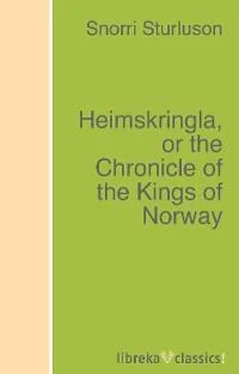Snorri Sturluson - Heimskringla, or the Chronicle of the Kings of Norway
Здесь есть возможность читать онлайн «Snorri Sturluson - Heimskringla, or the Chronicle of the Kings of Norway» — ознакомительный отрывок электронной книги совершенно бесплатно, а после прочтения отрывка купить полную версию. В некоторых случаях можно слушать аудио, скачать через торрент в формате fb2 и присутствует краткое содержание. Жанр: unrecognised, на английском языке. Описание произведения, (предисловие) а так же отзывы посетителей доступны на портале библиотеки ЛибКат.
- Название:Heimskringla, or the Chronicle of the Kings of Norway
- Автор:
- Жанр:
- Год:неизвестен
- ISBN:нет данных
- Рейтинг книги:3 / 5. Голосов: 1
-
Избранное:Добавить в избранное
- Отзывы:
-
Ваша оценка:
- 60
- 1
- 2
- 3
- 4
- 5
Heimskringla, or the Chronicle of the Kings of Norway: краткое содержание, описание и аннотация
Предлагаем к чтению аннотацию, описание, краткое содержание или предисловие (зависит от того, что написал сам автор книги «Heimskringla, or the Chronicle of the Kings of Norway»). Если вы не нашли необходимую информацию о книге — напишите в комментариях, мы постараемся отыскать её.
libreka classics – These are classics of literary history, reissued and made available to a wide audience.
Immerse yourself in well-known and popular titles!
Heimskringla, or the Chronicle of the Kings of Norway — читать онлайн ознакомительный отрывок
Ниже представлен текст книги, разбитый по страницам. Система сохранения места последней прочитанной страницы, позволяет с удобством читать онлайн бесплатно книгу «Heimskringla, or the Chronicle of the Kings of Norway», без необходимости каждый раз заново искать на чём Вы остановились. Поставьте закладку, и сможете в любой момент перейти на страницу, на которой закончили чтение.
Интервал:
Закладка:
King Halfdan was a wise man, a man of truth and uprightness—who made laws, observed them himself, and obliged others to observe them. And that violence should not come in place of the laws, he himself fixed the number of criminal acts in law, and the compensations, mulcts, or penalties, for each case, according to every one's birth and dignity (1).
Queen Ragnhild gave birth to a son, and water was poured over him, and the name of Harald given him, and he soon grew stout and remarkably handsome. As he grew up he became very expert at all feats, and showed also a good understanding. He was much beloved by his mother, but less so by his father.
8. HALFDAN'S MEAT VANISHES AT A FEAST
King Halfdan was at a Yule-feast in Hadeland, where a wonderful thing happened one Yule evening. When the great number of guests assembled were going to sit down to table, all the meat and all the ale disappeared from the table. The king sat alone very confused in mind; all the others set off, each to his home, in consternation. That the king might come to some certainty about what had occasioned this event, he ordered a Fin to be seized who was particularly knowing, and tried to force him to disclose the truth; but however much he tortured the man, he got nothing out of him. The Fin sought help particularly from Harald, the king's son, and Harald begged for mercy for him, but in vain. Then Harald let him escape against the king's will, and accompanied the man himself. On their journey they came to a place where the man's chief had a great feast, and it appears they were well received there. When they had been there until spring, the chief said, "Thy father took it much amiss that in winter I took some provisions from him,—now I will repay it to thee by a joyful piece of news: thy father is dead; and now thou shalt return home, and take possession of the whole kingdom which he had, and with it thou shalt lay the whole kingdom of Norway under thee."
9. HALFDAN S DEATH.
Halfdan the Black was driving from a feast in Hadeland, and it so happened that his road lay over the lake called Rand. It was in spring, and there was a great thaw. They drove across the bight called Rykinsvik, where in winter there had been a pond broken in the ice for cattle to drink at, and where the dung had fallen upon the ice the thaw had eaten it into holes. Now as the king drove over it the ice broke, and King Halfdan and many with him perished. He was then forty years old. He had been one of the most fortunate kings in respect of good seasons. The people thought so much of him, that when his death was known and his body was floated to Ringerike to bury it there, the people of most consequence from Raumarike, Vestfold, and Hedemark came to meet it. All desired to take the body with them to bury it in their own district, and they thought that those who got it would have good crops to expect. At last it was agreed to divide the body into four parts. The head was laid in a mound at Stein in Ringerike, and each of the others took his part home and laid it in a mound; and these have since been called Halfdan's Mounds.
HARALD HARFAGER'S SAGA.
1. HARALD'S STRIFE WITH HAKE AND HIS FATHER GANDALF.
Harald (1) was but ten years old when he succeeded his father (Halfdan the Black). He became a stout, strong, and comely man, and withal prudent and manly. His mother's brother, Guthorm, was leader of the hird, at the head of the government, and commander ('hertogi') of the army. After Halfdan the Black's death, many chiefs coveted the dominions he had left. Among these King Gandalf was the first; then Hogne and Frode, sons of Eystein, king of Hedemark; and also Hogne Karuson came from Ringerike. Hake, the son of Gandalf, began with an expedition of 300 men against Vestfold, marched by the main road through some valleys, and expected to come suddenly upon King Harald; while his father Gandalf sat at home with his army, and prepared to cross over the fiord into Vestfold. When Duke Guthorm heard of this he gathered an army, and marched up the country with King Harald against Hake. They met in a valley, in which they fought a great battle, and King Harald was victorious; and there fell King Hake and most of his people. The place has since been called Hakadale. Then King Harald and Duke Guthorm turned back, but they found King Gandalf had come to Vestfold. The two armies marched against each other, and met, and had a great battle; and it ended in King Gandalf flying, after leaving most of his men dead on the spot, and in that state he came back to his kingdom. Now when the sons of King Eystein in Hedemark heard the news, they expected the war would come upon them, and they sent a message to Hogne Karuson and to Herse Gudbrand, and appointed a meeting with them at Ringsaker in Hedemark.
2. KING HARALD OVERCOMES FIVE KINGS.
After the battle King Harald and Guthorm turned back, and went with all the men they could gather through the forests towards the Uplands. They found out where the Upland kings had appointed their meeting-place, and came there about the time of midnight, without the watchmen observing them until their army was before the door of the house in which Hogne Karuson was, as well as that in which Gudbrand slept. They set fire to both houses; but King Eystein's two sons slipped out with their men, and fought for a while, until both Hogne and Frode fell. After the fall of these four chiefs, King Harald, by his relation Guthorm's success and powers, subdued Hedemark, Ringerike, Gudbrandsdal, Hadeland, Thoten, Raumarike, and the whole northern part of Vingulmark. King Harald and Guthorm had thereafter war with King Gandalf, and fought several battles with him; and in the last of them King Gandalf was slain, and King Harald took the whole of his kingdom as far south as the river Raum.
3. OF GYDA, DAUGHTER OF EIRIE.
King Harald sent his men to a girl called Gyda, daughter of King Eirik of Hordaland, who was brought up as foster-child in the house of a great bonde in Valdres. The king wanted her for his concubine; for she was a remarkably handsome girl, but of high spirit withal. Now when the messengers came there, and delivered their errand to the girl, she answered, that she would not throw herself away even to take a king for her husband, who had no greater kingdom to rule over than a few districts. "And methinks," said she, "it is wonderful that no king here in Norway will make the whole country subject to him, in the same way as Gorm the Old did in Denmark, or Eirik at Upsala." The messengers thought her answer was dreadfully haughty, and asked what she thought would come of such an answer; for Harald was so mighty a man, that his invitation was good enough for her. But although she had replied to their errand differently from what they wished, they saw no chance, on this occasion, of taking her with them against her will; so they prepared to return. When they were ready, and the people followed them out, Gyda said to the messengers, "Now tell to King Harald these my words. I will only agree to be his lawful wife upon the condition that he shall first, for my sake, subject to himself the whole of Norway, so that he may rule over that kingdom as freely and fully as King Eirik over the Swedish dominions, or King Gorm over Denmark; for only then, methinks, can he be called the king of a people."
4. KING HARALD'S VOW.
Now came the messengers back to King Harald, bringing him the words of the girl, and saying she was so bold and foolish that she well deserved that the king should send a greater troop of people for her, and inflict on her some disgrace. Then answered the king, "This girl has not spoken or done so much amiss that she should be punished, but rather she should be thanked for her words. She has reminded me," said he, "of something which it appears to me wonderful I did not think of before. And now," added he, "I make the solemn vow, and take God to witness, who made me and rules over all things, that never shall I clip or comb my hair until I have subdued the whole of Norway, with scat (1), and duties, and domains; or if not, have died in the attempt." Guthorm thanked the king warmly for his vow; adding, that it was royal work to fulfil royal words.
Читать дальшеИнтервал:
Закладка:
Похожие книги на «Heimskringla, or the Chronicle of the Kings of Norway»
Представляем Вашему вниманию похожие книги на «Heimskringla, or the Chronicle of the Kings of Norway» списком для выбора. Мы отобрали схожую по названию и смыслу литературу в надежде предоставить читателям больше вариантов отыскать новые, интересные, ещё непрочитанные произведения.
Обсуждение, отзывы о книге «Heimskringla, or the Chronicle of the Kings of Norway» и просто собственные мнения читателей. Оставьте ваши комментарии, напишите, что Вы думаете о произведении, его смысле или главных героях. Укажите что конкретно понравилось, а что нет, и почему Вы так считаете.












